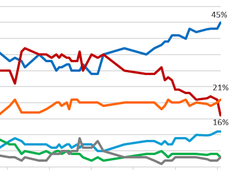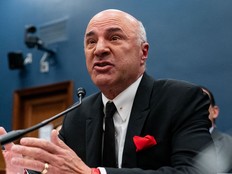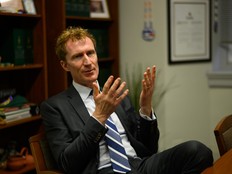
31 Dec What could happen to the Liberal government? Three possible scenarios for the House of Commons
As Parliamentarians of all stripes head home for the holidays, their hands are likely full of gifts (maybe a bottle of Speaker’s Scotch or Canadian whisky?) and their heads full of questions about what will happen to the federal government.
Last week marked one of the wildest ends of a Parliamentary session in recent history. Within five days, Finance Minister Chrystia resigned on the morning of the fall economic statement, the government announced a $62-billion deficit, dozens of Liberal MPs called for Trudeau’s resignation and the prime minister massively shuffled his cabinet by adding eight new faces to the table.
Trudeau’s fate as head of the Liberal party is also increasingly in question, with reports noting he’s taking the holiday break to reflect on his future. That means a lot can happen by the time the House of Commons resumes on Jan. 27.
Either way, the Liberal government’s days are numbered, with all three opposition party leaders having announced they will support a non-confidence vote this spring.
To help our readers sound like the most erudite politicos at their holiday family gatherings, National Post presents three possible scenarios of what happens to the House of Commons.
Justin Trudeau steps down as Liberal leader
As more and more Liberal MPs call on Trudeau to step down as party leader, the chances of the prime minister reneging on his commitment to stay on as head of the party have gone from implausible to possible.
Were Trudeau to announce he was stepping down as Liberal leader in the coming weeks, the most likely scenario is that he also decides to prorogue Parliament, say Lagassé and former senior House of Commons counsel Steve Chaplin.
“A leadership race is a perfect excuse to prorogue,” Lagassé said. For Chaplin, this scenario is likely the “best” option for the Liberals, though it likely creates a “Kim Campbell-like” situation for Trudeau’s successor.
A prorogation is basically pressing “reset” on the parliamentary session. It wipes the legislative agenda clean and allows the government to come back with a new throne speech that sets out its new priorities.
And in this case, it would also allow the Liberals to organize a new leadership race to find Trudeau’s replacement. Lagassé said that in all likelihood, the Liberals could prorogue Parliament until the end of March without worrying about the government running out of money to operate
“Firstly, Prorogation gives the time for the leadership contest take place. Second of all, you get a new prime minister, a new government and a speech from the throne. And a vote on that speech is obviously a vote of confidence,” Chaplin said.
He surmised that the speech from the throne would most likely sound like an electoral platform because the Liberals would expect to lose the confidence vote.
Trudeau stays on as Liberal leader
If Trudeau stays on as leader, he could just as well prorogue Parliament to reset the agenda.
But if he doesn’t, the Liberal government isn’t guaranteed to fall immediately. That’s because the House of Commons could remain jammed with the same parliamentary privilege debate over access to documents about the so-called “green slush fund” that ate up the entire fall session.
Opposition parties also can’t bring forth a non-confidence motion until what are called supply days or “opposition days.” But those are determined by the government, which could theoretically set them all for the end of the Parliamentary session in June.
Also, ironically, the procedural logjam caused by the Conservative-led parliamentary privilege debate could allow the Liberal government to stay in power a bit longer, Chaplin says. That’s because the privilege debate takes precedence over any other business, including confidence votes like financial bills.
“The Opposition would have to finely manoeuver the government into either giving them a supply day or letting the government introduce some sort of financial type of legislation … in which a defeat would be seen as non-confidence,” he added.
Another question is if the Bloc and New Democratic Party will maintain their non-confidence in the Liberals forever, Lagassé said. He noted that the Liberals could approach either party with legislation that could ensure either party’s support.
“When you’re dealing with three opposition parties who have to come together to vote non-confidence, there’s always the risk of one of them defecting or seeing more of an opportunity in keeping going,” he said.
The New Democratic Party’s Jagmeet Singh, he noted, appeared particularly fickle in his non-confidence of Trudeau last week.
“It’s hard to put too much weight on his words at this point,” Lagassé said of Singh. “He has cried wolf seemingly on several occasions … the New Democratic Party’s word is kind of like bitcoin value at this point.”
And what of rumours that Trudeau could prorogue until June to ensure he could host the G7 meeting in Alberta?
“That would strike me as uncouth but not impossible,” Lagassé said.
Trudeau dissolves Parliament in the next few weeks, sparking an election
Lagassé and Chaplin both admit this is the least likely of all outcomes, but still possible. With all three opposition parties having declared they’ve lost confidence in the government, Trudeau could decide to send Canadians to the polls.
Lagassé says that would be the honourable thing to do after a session in which the legislative agenda was completely jammed due to debate between the Liberals and oppositions over multiple parliamentary privilege questions.
“We’re living in a Monty Python sketch, the dead parrot government Parliament,” Lagassé said in reference to the famed British sketch in which a shopkeeper tries to convince a client that the dead parrot he sold him is not dead.
“The prime minister (is) this shopkeeper who keeps trying to insist that this Parliament’s viable. And you know, we’re all just sitting there, as the person who bought the parrot, going ‘this Parliament is dead. It’s deceased!’” he added.
Poilievre asked the Governor General to reconvene Parliament for a confidence vote, can that happen?
No. The Governor General can recommend that the prime minister reconvene Parliament but couldn’t do it herself.







No Comments